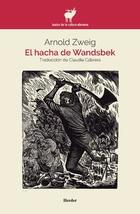
During his exile in the Palestinian Haifa, between 1941 and 1943, Arnold Zweig published in Hebrew the novel The Ax of Wandsbek: the story of the butcher Albert Teetjen, whose fate is predetermined after agreeing to replace the executioner of the Fuhlsbüttel prison. In a magnificent epic composition, rich in characters and events full of suspense, one of the most realistic and effective representations of German fascism is read. It is a story about the seducers and the seduced, about the circumstances and intellectual currents that defeated the German bourgeoisie and left her defenseless against Nazi barbarism.
When reading in the Deutsche Volkszeitung newspaper of April 18, 1937 the note about a certain butcher who became an executioner, Arnold Zweig wrote to his friend Sigmund Freud: “In this real novel a human being completely involved in Nazism would be described, but that i...read more






